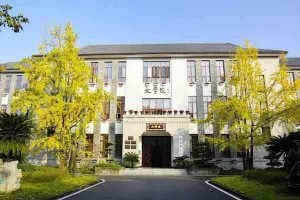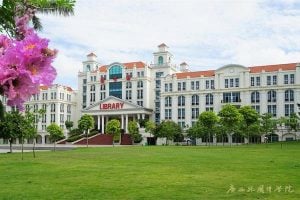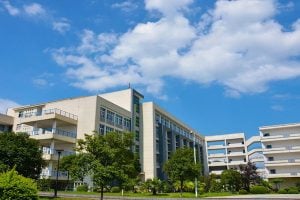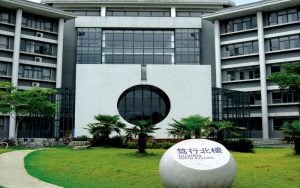
Zhejiang Shuren University
![]()
Introduction to Zhejiang Shuren University
Zhejiang Shuren University (ZSU, website) was founded in 1984. The school is organized by the Zhejiang Political Consultative Conference and headed by the Provincial Department of Education.
At present, Zhejiang Shuren University has two campuses, Hangzhou Gongyi Bridge and Shaoxing Yangxun Bridge, covering an area of 1,232 acres, with a total value of teaching equipment of more than 200 million yuan, a library of more than 1.8 million books, and more than 880,000 electronic books.
Zhejiang Shuren University currently has nearly 17,000 students, 13 secondary colleges, 47 undergraduate majors and 8 specialties. There are 1,200 faculty members, including 880 teachers, more than 160 doctors, and 80.7% of them are masters.
Zhejiang Shuren University is committed to the cultivation of advanced applied talents. The school has 195 off-campus internship training bases, including one national-level university students’ off-campus practice education base and two provincial-level college students’ off-campus practice education bases. Zhejiang Shuren University pays attention to the organic integration of professional education and innovation and entrepreneurship, and has established a “college student entrepreneurship industrial park” and other college students’ innovative and entrepreneurial carriers. The initial employment rate of undergraduate graduates is about 97%. The school has a postgraduate course to encourage graduates who wish to continue their studies to pursue postgraduate studies.
Since its establishment, Zhejiang Shuren University has trained more than 80,000 applied talents for the country and society. The school pays attention to open education, and has established friendly and cooperative relations with more than 60 institutions and institutions in the United States, Canada, the United Kingdom, France, Belarus, Japan, South Korea and other countries, as well as Hong Kong, Macao and Taiwan, and selects a certain number of outstanding each year. Students go to overseas universities to study, develop students’ international vision and promote cultural exchanges.
International Cooperation
At present, Zhejiang Shuren University has established friendly exchanges with more than 60 institutions and institutions in Japan, South Korea, the United States, Canada, the United Kingdom, Germany, Australia, Belarus, Taiwan, Hong Kong, Macao and other countries and regions. Exchange visits, lectures, lectures, teacher training, student exchanges, credit recognition, curriculum cooperation, dual-degree joint education, scientific research cooperation, cultural exchanges and other activities.
Zhejiang Shuren University regularly organizes international theme lectures, competitions or speeches, organizes seminars related to international topics, and conducts mutual recognition of credits, double-degree courses, mutual exchanges, overseas internships, language and cultural studies, etc. Cooperation. During the “Twelfth Five-Year Plan” period, students were sent to Japan, South Korea, the United Kingdom, Canada, Germany, Australia, Belarus, Taiwan, Macao and other countries and regions for exchanges of more than 370 students, double-degree courses, cultural exchanges, and internships; . They are from South Korea, the United States, France, Germany, Niger, Ghana, Venezuela, Jordan, Ukraine, Cameroon, and Thailand.
Strengthening the internationalization of the teaching staff, Zhejiang Shuren University employs 63 foreign teachers in English, Japanese, Korean and German languages; invites professors and experts from outside the country to give lectures and lectures to more than 60 people; University 2016 and York University of Canada The Jacksonville University of the United States co-organized a teacher training session.
![]() Campus
Campus
Video
Campus Views
Introduction
![]() Foreign Teachers at Zhejiang Shuren University
Foreign Teachers at Zhejiang Shuren University
![]() About Hangzhou
About Hangzhou
Hangzhou is the provincial capital of Zhejiang Province, a strong economical province in China. It is the transportation hub, the political, economic, cultural and financial center of Zhejiang Province.
At the end of 2018, the Hangzhou metropolitan area has an area of 53,239 square kilometers and a population of 25.698 million. According to the “China Metropolitan Area Evaluation Index” issued by Shanghai Jiaotong University, Hangzhou is the fourth largest metropolitan area in China after Shanghai, Guangzhou and Beijing. In 2015, Hangzhou’s economic aggregate ranked 10th in mainland China, and was rated as the best commercial city in mainland China by Forbes. As the headquarters of Alibaba and other Internet industry companies, the city has a strong population appeal to Internet industry personnel.
Teaching Program
![]() ISAC University Teaching Program
ISAC University Teaching Program
Related Universities











